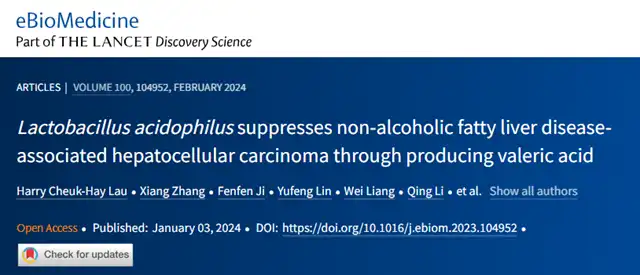What role does Lactobacillus acidophilus play in combating liver cancer?
- Normal Liver Cells Found to Promote Cancer Metastasis to the Liver
- Nearly 80% Complete Remission: Breakthrough in ADC Anti-Tumor Treatment
- Vaccination Against Common Diseases May Prevent Dementia!
- New Alzheimer’s Disease (AD) Diagnosis and Staging Criteria
- Breakthrough in Alzheimer’s Disease: New Nasal Spray Halts Cognitive Decline by Targeting Toxic Protein
- Can the Tap Water at the Paris Olympics be Drunk Directly?
What role does Lactobacillus acidophilus play in combating liver cancer?
- Should China be held legally responsible for the US’s $18 trillion COVID losses?
- CT Radiation Exposure Linked to Blood Cancer in Children and Adolescents
- FDA has mandated a top-level black box warning for all marketed CAR-T therapies
- Can people with high blood pressure eat peanuts?
- What is the difference between dopamine and dobutamine?
- How long can the patient live after heart stent surgery?
What role does Lactobacillus acidophilus play in combating liver cancer?
The gut microbiota is an integral part of the human body, with trillions of bacteria living in our intestines playing a crucial role in health. They affect metabolism, digestion, infection resistance, drug response, and can even prevent certain cancers.
Non-alcoholic fatty liver disease is the most common chronic liver disease in China, with over 150 million patients currently, which can further progress to non-alcoholic steatohepatitis, cirrhosis, and liver cancer.
Lactobacillus acidophilus is a common lactic acid bacterium that exists in the human digestive tract and is a probiotic. It is currently unclear whether Lactobacillus acidophilus helps prevent non-alcoholic fatty liver disease-related liver cancer.
On January 3, 2024, researchers at the University of Hong Kong published a research paper titled “Lactobacillus acidophilus suppresses non-alcoholic fatty liver disease-associated hepatocellular carcinoma through producing valeric acid” in the journal “eBioMedicine” of The Lancet subjournal.
The study showed that supplementing Lactobacillus acidophilus can suppress non-alcoholic fatty liver disease-related liver cancer in mice. Metabolomics analysis revealed that the anti-cancer effect is attributed to valeric acid produced by Lactobacillus acidophilus, which was confirmed in human and mouse cells. Additionally, valeric acid also improved the integrity and function of the intestinal barrier.
Mechanistically, valeric acid binds to G protein-coupled receptors (GPCRs) on the surface of liver cells, deactivating carcinogenic signaling pathways, thereby eliminating non-alcoholic fatty liver disease-related liver cancer.

In this study, researchers first analyzed changes in the gut microbiota of mice with non-alcoholic fatty liver disease-related liver cancer and found that these mice were severely lacking in Lactobacillus acidophilus compared to control mice.
Furthermore, researchers fed a group of 6-month-old liver cancer mice models with Lactobacillus acidophilus or a control treatment for 28 weeks and analyzed tumor changes in the mice’s livers. They found that compared to the control group, mice supplemented with Lactobacillus acidophilus significantly reduced the number, size, and burden of tumors.
Histological evaluation revealed significantly reduced fat degeneration and inflammation in non-tumor liver tissue of mice treated with Lactobacillus acidophilus, with significantly lower levels of liver injury markers alanine aminotransferase (ALT), aspartate aminotransferase (AST), and cholesterol. Additionally, supplementing Lactobacillus acidophilus reduced the proportion of proliferating cells.
These findings suggest that Lactobacillus acidophilus has anti-tumor effects on non-alcoholic fatty liver disease-related liver cancer.
Next, researchers analyzed the effects of Lactobacillus acidophilus on the gut microbiota and found that it increased the abundance of beneficial symbiotic bacteria while reducing potential pathogens.
Researchers also demonstrated the unique beneficial effects of Lactobacillus acidophilus in germ-free mice. Compared to the control group, Lactobacillus acidophilus treatment significantly reduced the number, size, and burden of tumors, as well as reduced fat degeneration and inflammation in non-tumor liver tissue, and decreased ALT, AST, and cholesterol levels.
This indicates that treatment with Lactobacillus acidophilus alone is sufficient to suppress liver cancer.
Finally, researchers analyzed the anti-tumor mechanism of Lactobacillus acidophilus and found that its anti-cancer effect is attributed to its metabolite – valeric acid, rather than the bacteria itself.
Cell experiments in vitro showed that valeric acid inhibits the viability of human and mouse liver cancer cells in a concentration-dependent manner but has no effect on normal human and mouse liver cells.
Moreover, valeric acid also improved the integrity and function of the intestinal barrier in mice with non-alcoholic fatty liver disease-related liver cancer.
Mechanistically, valeric acid binds to G protein-coupled receptors (GPCRs) on liver cells’ surface, deactivating carcinogenic signaling pathways, thereby eliminating non-alcoholic fatty liver disease-related liver cancer.
The researchers stated that this study is the first to discover the anti-tumor effect of Lactobacillus acidophilus on mice with non-alcoholic fatty liver disease-related liver cancer, indicating the potential of probiotics in preventing liver cancer development.
In conclusion, the study suggests that supplementing Lactobacillus acidophilus can inhibit the development of non-alcoholic fatty liver disease-related liver cancer in mice, reduce tumor growth, alleviate fat degeneration and inflammation in non-tumor liver tissue, and improve the integrity and function of the intestinal barrier. Further clinical studies are needed to confirm its feasibility in alleviating the progression from non-alcoholic fatty liver disease to liver cancer in humans.
Paper link:
https://doi.org/10.1016/j.ebiom.2023.104952
What role does Lactobacillus acidophilus play in combating liver cancer?
(source:internet, reference only)
Disclaimer of medicaltrend.org
Important Note: The information provided is for informational purposes only and should not be considered as medical advice.



